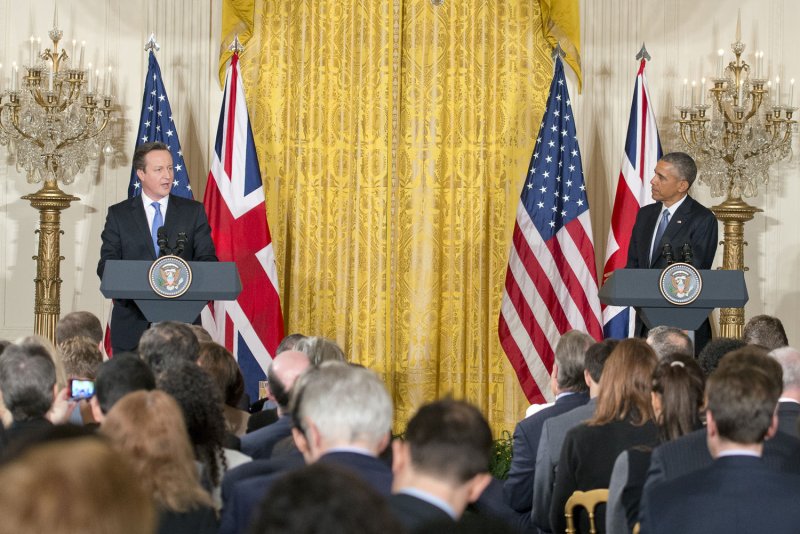United States President Barack Obama, right, and Prime Minister David Cameron of the United Kingdom, left, hold a joint press conference in the East Room of the White House in Washington, D.C. on Friday, January 16, 2015. During the course of the press conference the leaders touched on issues such as cybersecurity, terrorism, IS and the economy. UPI/Photo by Ron Sachs/Pool |
License Photo
WASHINGTON, May 26 (UPI) -- First a note to my readers. UPI has granted me the great honor and distinction of being named the first person to become UPI's just created Arnaud de Borchgrave distinguished columnist. As those who know me know, it will be impossible to duplicate Arnaud's intellect, wisdom, insights, sense of humor and more than occasional irreverence. However, this appointment does recognize Arnaud's monumental contribution to journalism and reporting truth and fact as he saw both. I am profoundly humbled and hugely appreciative.
* * * *
Prior to Prime Minister David Cameron's and the Conservative Party's stunning and surprising electoral victory on May 7th, the "special relationship" between the United States and Great Britain was very much in doubt. That relationship began in the crucible of world war forged by the two great leaders Winston Churchill and Franklin Roosevelt. But well into the second decade of the 21st century, the strength of this bond had seriously eroded.
Despite the many "ups" (partners in NATO; prevailing in the Cold War; winning the Gulf War of 1991; and rallying over Afghanistan after 9/11) and the "downs" (the Suez crisis of 1956; exiting east of Suez in 1967; the 2003 invasion of Iraq; and the debacle in 2013 over retaliating against Syria's use of chemical weapons), the latter half of the 20th century was made more secure by the intimate and proximate linkages made possible through this special relationship.
Unfortunately, the signals and chemistry emanating from Washington and Whitehall on the special relationship have not been encouraging. President Barack Obama clearly saw Asia and the Pacific as the geo-economic and strategic centers of gravity superseding Europe. The strategic "pivot" to Asia, announced with great fanfare three years ago and modified in phrase to "rebalancing," underscored White House priorities. Obama has never been a Europhile, seemingly recognizing its importance only every two years before the biannual NATO summit or in reacting to Russian aggression in Ukraine.
Nor are Obama and Cameron personally, politically or intellectually as close as their predecessors.
When Britain and France took the initiative in launching air strikes against Libyan dictator Moammar Gadhafi in 2011 based on the false premise that the colonel was determined to wage genocide on Benghazi residents in the civil war, Washington was a reluctant partner choosing to "lead from behind."
Two years later, Cameron and Obama were prepared to punish Syria with air strikes for using chemical weapons against civilians. But Parliament voted no, embarrassing the two leaders by denying authority to attack.
This distancing has departed from decades of highly collaborative presidential and prime ministerial interactions. Margaret Thatcher and Presidents Ronald Reagan and George H.W. Bush were virtual soul mates. Tony Blair continued that proximity with both Bill Clinton and George W. Bush although his acquiescence in supporting the catastrophic Iraq invasion of 2003 earned him the British press's sobriquet of "Poodle."
The United States and United Kingdom do maintain a very special military relationship despite the cutbacks in the British forces. Hundreds of exchange officers populate each other's staffs. Both share nuclear technologies and deterrent weapons. And intelligence cooperation along with Canada, Australia and New Zealand (the "five eyes") could not be closer. However, a military relationship alone is perhaps insufficient. And Britain is no longer a great military power and will be hard pressed to remain a meaningful one.
Under these circumstances, should or will the special relationship be maintained? Or should Washington and London look for other options? And will these questions even be asked? The path of least resistance is inaction. But this would be a fig leaf and ostrich option pretending that a special relationship exists when it does not.
Cameron's majority in Parliament offers an opportunity to rebuild this special relationship provided Washington and London are prepared to grasp it. Clearly the rout of Labor and new dominance of the Scottish Nationalist Party raise the questions of union and indeed the end of the United Kingdom if Scotland were to be granted full independence. And Tory Euro-skeptics will make the referendum on continued British membership in the European Union problematic.
However, a re-strengthening of the special relationship in which the UK remains America's special partner in Europe could have very positive effects in dampening the likelihood of Scottish secession from the United Kingdom and Britain from the EU. The renewed relationship would link the United States more intimately with the continent that -- for the time being -- remains the most important geostrategic and economic center of gravity in the world.
As the arc of chaos and instability reaches from the North African coast through the Middle East to the Bay of Bengal and even to the tiny islets in the China seas, the American-European alliance is more critical as a foundation for security. The strongest or weakest link in this chain is the Anglo-American relationship. Both Washington and London must understand this reality and act accordingly.
This special relationship is vital to Western and global security. It should not be allowed to drift into ignominy.
___________________________________________________________________
Harlan Ullman is UPI's Arnaud de Borchgrave distinguished columnist and Chairman of the Killowen Group that advises leaders of government and business, Senior Advisor at Washington D.C.'s Atlantic Council and Business Executives for National Security. His latest book is A Handful of Bullets: How the Murder of Archduke Franz Ferdinand Still Menaces the Peace.















